
"Promised Land" is a song lyric written by Chuck Berry to the melody of "Wabash Cannonball", an American folk song. The song was first recorded in this version by Berry in 1964 for his album St. Louis to Liverpool. Released in December 1964, it was Berry's fourth single issued following his prison term for a Mann Act conviction. The record peaked at #41 in the Billboard charts on January 16, 1965.
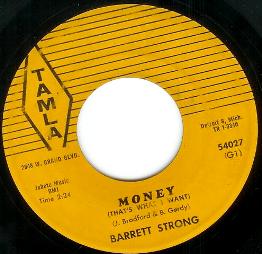
"Money (That's What I Want)" is a rhythm and blues song written by Tamla founder Berry Gordy and Janie Bradford, which was the first hit record for Gordy's Motown enterprise. Barrett Strong recorded it in 1959 as a single for the Tamla label, distributed nationally on Anna Records. Many artists later recorded the tune, including the Beatles in 1963 and the Flying Lizards in 1979.

"Rock and Roll Music" is a song by American musician and songwriter Chuck Berry, written and recorded by Berry in May 1957. It has been widely covered and is one of Berry's most popular and enduring compositions.
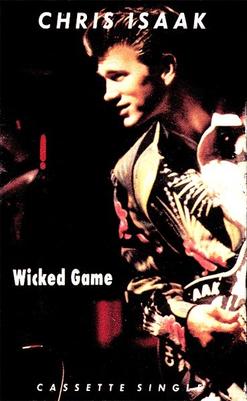
"Wicked Game" is a song by American rock musician Chris Isaak, released from his third album, Heart Shaped World (1989). Released as a single in July 1989, it became a sleeper hit after being featured in the 1990 David Lynch film Wild at Heart, starring Nicolas Cage and Laura Dern. Lee Chesnut, an Atlanta radio station music director who loved David Lynch films, began playing the song, and it quickly became an American top-10 hit in January 1991, reaching number six on the Billboard Hot 100. Internationally, the single became a number-one hit in Belgium and reached the top 10 in several other nations.
"Always on My Mind" is a ballad written by Wayne Carson, Johnny Christopher, and Mark James, first recorded by Brenda Lee and first released by Gwen McCrae in March 1972. Lee's version was released three months later in June 1972. The song has been a crossover hit, charting in both the country and western and pop categories. Elvis Presley's recording was the first commercially successful version of the song.
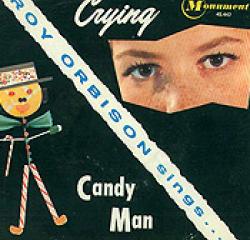
"Crying" is a song written by Roy Orbison and Joe Melson for Orbison's third studio album of the same name (1962). Released in 1961, it was a number 2 hit in the US for Orbison and was covered in 1978 by Don McLean, whose version went to number 1 in the UK in 1980.

"Shop Around" is a song originally recorded by the Miracles on Motown Records' Tamla subsidiary label. It was written by Miracles lead singer Smokey Robinson and Motown Records founder Berry Gordy. It became a smash hit in 1960 when originally recorded by the Miracles, reaching number one on the Billboard R&B chart, number one on the Cashbox Top 100 Pop Chart, and number two on the Billboard Hot 100 chart. It was the Miracles' first million-selling hit record, and the first-million-selling hit for the Motown Record Corporation.

"You Got It" is a song from American singer Roy Orbison's 22nd studio album, Mystery Girl (1989). The song was released posthumously on January 3, 1989, after Orbison's death from a heart attack on December 6, 1988. The song was issued with "The Only One" as the B-side and was later released with "Crying". The single reached number nine on the US Billboard Hot 100 and number one on the Adult Contemporary chart, returning Orbison to the top 10 for the first time in 25 years. "You Got It" also reached number three on the UK Singles Chart and entered the top five in 10 other countries. Although it is an Orbison solo single, Orbison's fellow Traveling Wilburys bandmates Tom Petty and Jeff Lynne co-wrote the song and played instruments on the record.
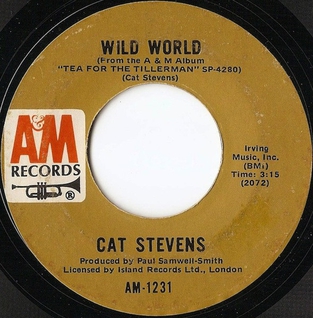
"Wild World" is a song written and recorded by English singer-songwriter Cat Stevens. It first appeared on his fourth album, Tea for the Tillerman (1970). Released as a single in September 1970 by Island Records and A&M Records, "Wild World" saw significant commercial success, garnering attention for its themes of love and heartbreak, and has been covered numerous times since its release. Maxi Priest and Mr. Big had successful cover versions of the song, released in 1988 and 1993.

"Go West" is a song by American disco group Village People, released in June 1979 by Casablanca Records as the second single from their fourth studio album of the same name (1979). The song was written by Jacques Morali, Henri Belolo and lead singer Victor Willis, while Morali produced it. It was successful in the disco scene during the late 1970s and a top-20 hit in Belgium, Ireland and the UK. "Go West" found further success when it was covered in 1993 by English synth-pop duo Pet Shop Boys.
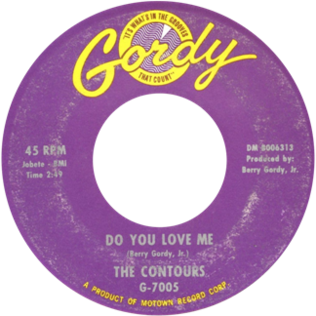
"Do You Love Me" is a rhythm and blues song recorded by the Contours in 1962. Written and produced by Motown Records owner Berry Gordy Jr., it appeared twice on the Billboard Hot 100 chart, reaching numbers three in 1962 and eleven in 1988.
"When You Walk in the Room" is a song written and recorded by Jackie DeShannon. It was initially released as a single on November 23, 1963, as the B-side to "Till You Say You'll Be Mine". It was re-released as an A-side in September 1964, and later included on the album Breakin' It Up on the Beatles Tour. The single charted on the US Billboard Hot 100, peaking at number 99.
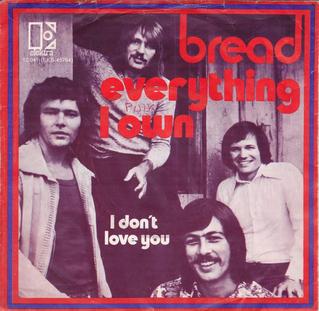
"Everything I Own" is a song written by American singer-songwriter David Gates. It was originally recorded by Gates's soft rock band Bread for their 1972 album Baby I'm-a Want You. The original reached No. 5 on the American Billboard Hot 100. Billboard ranked it as the No. 52 song for 1972. "Everything I Own" also reached No. 5 in Canada and No. 12 in Australia.
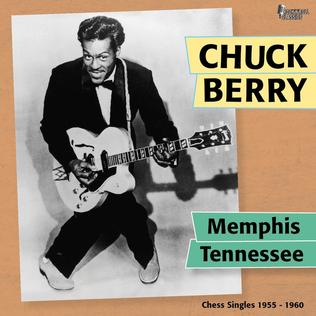
"Memphis, Tennessee", sometimes shortened to "Memphis", is a song by Chuck Berry, first released in 1959. In the UK, the song charted at number 6 in 1963; at the same time Decca Records issued a cover version in the UK by Dave Berry and the Cruisers, which also became a UK Top 20 hit single. Johnny Rivers's version of the song was a number two US hit in 1964.

"Crying in the Rain" is a song composed by Carole King with lyrics by Howard Greenfield, originally recorded by American duo the Everly Brothers. The single peaked at number six on the US Billboard Hot 100 in 1962.
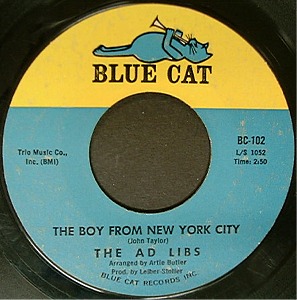
"The Boy from New York City" is a song originally recorded by the American soul group The Ad Libs, released in 1964 as their first single. Produced by Jerry Leiber and Mike Stoller, the song peaked at No. 8 on the US Billboard Hot 100 on the chart week of February 27, 1965. Though the group continued to record other singles, they never repeated the chart success of "The Boy from New York City". According to Artie Butler, the track was recorded at A&R Studios in New York, in three separate sessions. The first session was to lay down the rhythm section, then the next session was for the lead and backup vocals, with the last session was just for the horns.
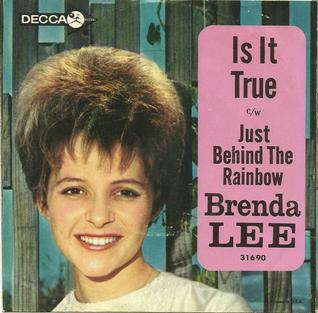
"Is It True" is a song released in 1964 by Brenda Lee. In 1964, Brenda Lee was flown by Decca to England to cut a single record, initially conceived for release exclusively in the United Kingdom, but it was in fact also released in the US shortly after release in the UK. "Is It True" was written by John Carter and Ken Lewis, then two of England's top songwriters.
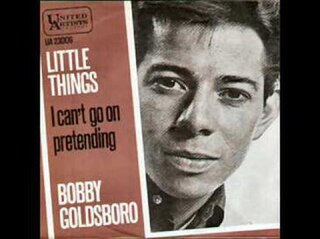
"Little Things" is a song written and sung by Bobby Goldsboro, which he recorded on November 19, 1964, and released in January 1965. The song reached number 13 on the Billboard Hot 100.

"Candy Man" is a song by Roy Orbison, released as the B-side to his international hit "Crying" in July 1961. It was later covered by British beat group Brian Poole and the Tremeloes, becoming a top-ten hit in the UK.
"It's Just a Little Bit Too Late" is a song written by Clint Ballard Jr. and Les Ledo, which was originally recorded by Clyde McPhatter in 1963. A British beat group named the Druids would release their version in 1964 before the definitive version by Wayne Fontana and the Mindbenders was recorded and released as a single in 1965. Their version was the second of three songs by Clint Ballard Jr. that the group recorded together with "The Game of Love" and "She Needs Love". Their rendition of the song reached number 20 in the UK's Record Retailer but failed to emulate the success of their previous single "The Game of Love", only reaching number 45 on the Billboard Hot 100.


















